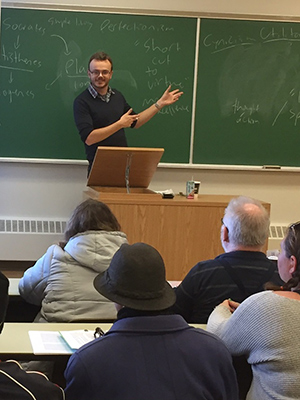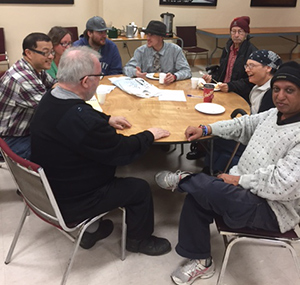Maurice Vernier, 52, has just finished six months in an addictions recovery program at the Ottawa Mission, a shelter for homeless men. Now living in a group home, he still has to undergo weekly breathalyser, blood and urine testing, but if he stays clean for one year he can move into his own apartment. And he’s almost there.
“I’ve been sober nine months now,” he says, ducking his head but smiling shyly. “I quit smoking four months ago, too. I really want to change everything.”
He says Discovery University is helping him do that. On this day, Mr. Vernier is sitting in the back row of a classroom in the University of Ottawa’s Tabaret Hall, where he is taking a course called Social Conflicts and Movements. A former pastor, he hasn’t set foot in a classroom since 1996 after graduating with a degree in theology from the University of Indiana.
Mr. Vernier surveys the room where some of his classmates are already in animated discussions or scanning today’s readings. Others quietly slide into seats and wait for the professor to call the room to order. “This has changed my life,” he says.
Discovery U is a program that allows adults who are living on a low income or experiencing homelessness to participate in free, non-credit university courses in the humanities and social sciences. The 10-week courses are taught by professors from the U of Ottawa, which also provides classroom space, Carleton University and Saint Paul University in partnership with the Ottawa Mission. Courses have been offered since 2005, starting in September and January.

Wisdom of the Ancients for Today for Discovery University.
Photo by Ann Elliott.
“This is one of the greatest positions I have ever had as a social worker,” says program coordinator Ann Elliott. She is quickly handing out bus tickets and slips of paper with next week’s reading assignment, briefly connecting with each student before the class starts.
“One of the issues around homelessness is isolation,” she says. “Offering programming like this helps them engage with society and experience healthy relationships, whether it’s with other students, professors or even a program coordinator. It lets them realize they’re not alone in the world, that there’s a community out there.”
Saint Paul University professor Richard Feist says teaching these classes “packs an emotional punch.” The students “are intensely interested in the material in a way that is quite refreshing and quite unbridled,” says Dr. Feist, who was teaching John Stuart Mill’s 18th-century essay Utilitarianism this past winter. “They ask a lot of questions, and they’re enormously enthusiastic.”
He also enjoys the range of students Discovery U puts in front of him. “A couple of students have told me, ‘I have a master’s degree’ or ‘I have a bachelor’s degree.’ Others have told me they’ve had no experience with higher education. But they are enormously excited to have a professor talk to them.”

semester. Photo by Ann Elliott.
Claire Delisle can relate. She barely gets her class in Social Conflicts and Movements under way before hands are waving and she’s fielding questions. “I feel so privileged to be doing this,” says Dr. Delisle, a professor of criminology at U of Ottawa. “I enjoy the students, the vibe, their engagement with the material, and I learn from them because they all come from a place of struggle.”
Programs similar to Discovery U are offered by a number of other Canadian universities, including University of Victoria’s University 101; University of British Columbia’s Humanities 101 community program; and Halifax Humanities 101, taught by professors from all of the city’s universities. These programs are patterned after the Clemente Course in the Humanities developed by New York author and educator Earl Shorris and first taught in 1995. Mr. Shorris believed that offering the poor and disenfranchised courses in the humanities helps them to break down the social barriers that accompany poverty. He also saw reflection and critical thinking as essential life skills.
“The stereotype is that a subject like philosophy is not practical,” says Dr. Feist. “Socrates famously says in The Republic, ‘look guys, the most important question we are going to talk about is the question of justice and how we are going to structure our society to live in harmony, generate goods and share values.’ That’s incredibly practical.”
Ginette Guilbert, 62, says Discovery U is about “building hope.” Working as a nurse, “I had a big burnout years ago and lost my job because of that. I went through two violent relationships. I am coming back from far away.”
Ms. Guilbert has lived in a women’s shelter but is planning to move into an apartment. “I want to be involved with other people. I am the grandmother of three and I want to contribute to building a better world for them and for all human beings.”
“Ginette is a very smart lady,” says Dr. Delisle. “She’s been around the block and has seen a lot of stuff. We need to remember there are people in this class who have the intellectual capacity to understand this material but have never thought to look because they’re too busy surviving. If you get them stabilized and you give them an opportunity, their minds broaden.”
Mr. Vernier says he likes the coursework but, for him, connecting with the other students is key. “It’s nice to be with other sober people who are also changing their lives,” he says. “I’ve made friends here and you really learn to appreciate people, their ideas, their thoughts. They are a wealth of information and wisdom.”
I’d be happy to help mount such a program here in London ON. We have Western University, King’s College, Brescia College, and Huron University College. Every university town should make the riches of our intellectual and artistic culture available to those who have felt such wealth is not for them; it is!